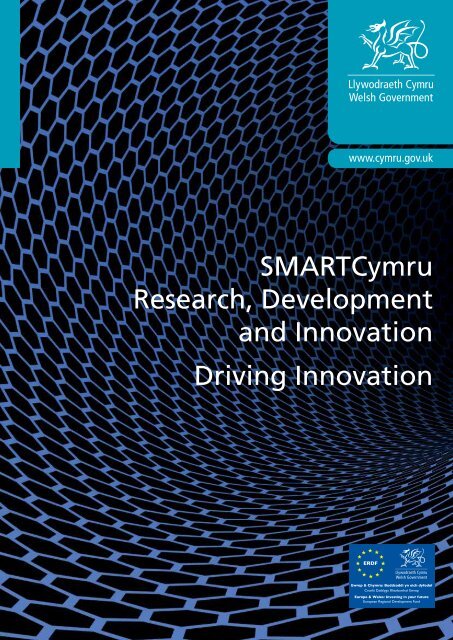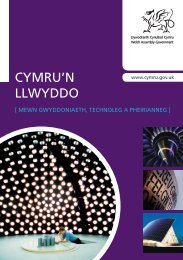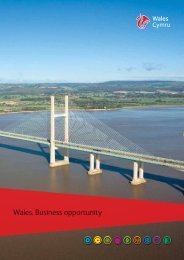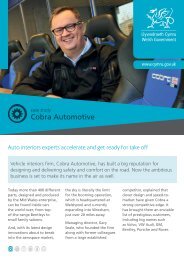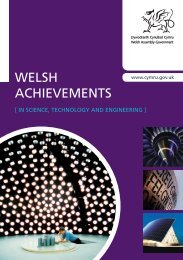SMARTCymru Research, Development and ... - Business Wales
SMARTCymru Research, Development and ... - Business Wales
SMARTCymru Research, Development and ... - Business Wales
Create successful ePaper yourself
Turn your PDF publications into a flip-book with our unique Google optimized e-Paper software.
<strong>SMARTCymru</strong><br />
<strong>Research</strong>, <strong>Development</strong><br />
<strong>and</strong> Innovation<br />
Driving Innovation
1<br />
contents<br />
2 Stimulating Success<br />
2 Supporting you every step of the way<br />
4 Phase 1: Technical <strong>and</strong> Commercial Feasibility (TCF)<br />
6 Phase 2: Industrial <strong>Research</strong> (IR)<br />
8 Phase 3: Experimental <strong>Development</strong> (ED)<br />
10 Phase 4: Exploitation<br />
11 Providing Financial Support <strong>and</strong> Innovation Advice<br />
11 RD&I Funding – Who can apply<br />
11 Next Steps<br />
Overview of Support Available<br />
Support is available for all sizes of business <strong>and</strong> for all phases of a<br />
research <strong>and</strong> development project.<br />
<strong>Research</strong> & <strong>Development</strong> & Innovation Support (RD&I)<br />
R&D Phase<br />
Technical <strong>and</strong><br />
Commercial<br />
Feasibility<br />
Industrial<br />
<strong>Research</strong><br />
Experimental<br />
<strong>Development</strong><br />
Small<br />
Enterprise<br />
Medium<br />
Enterprise<br />
Large<br />
Enterprise<br />
Limits<br />
Up to 75% Up to 75% Up to 65% £15,000<br />
Up to 70% Up to 60% Up to 50% £100,000<br />
Up to 45% Up to 35% Up to 25% £200,000<br />
Exploitation Up to 50% Up to 50% Up to 50% £20,000
overview<br />
Stimulating Success<br />
No matter what the size <strong>and</strong> scope of your company, developing<br />
new products <strong>and</strong> processes <strong>and</strong> successfully bringing them to<br />
market stimulates success.<br />
The rewards of successful research <strong>and</strong> development (R&D) can be<br />
significant. It can open up new markets, boost sales <strong>and</strong> increase<br />
profitability. But it is also a risky business. R&D requires investment<br />
in resources, people <strong>and</strong> expertise. It’s not a ‘quick-fix’ <strong>and</strong> can take<br />
considerable time to fully develop an idea <strong>and</strong> bring it to market.<br />
And R&D can be costly.<br />
For businesses operating in <strong>Wales</strong>, help is at h<strong>and</strong>. Through the<br />
Welsh Government’s RD&I (<strong>Research</strong>, <strong>Development</strong> & Innovation)<br />
team, funding <strong>and</strong> support is available at all stages of a research<br />
<strong>and</strong> development project.<br />
Our support is aimed at small <strong>and</strong> medium-sized enterprises (SMEs),<br />
as well as start-up businesses. We provide financial support <strong>and</strong><br />
innovation advice. We direct you to specialists <strong>and</strong> help you create<br />
connections. In short, we support you by sharing the risk.<br />
Supporting you every step of the way<br />
Support is available for all phases of a research <strong>and</strong> development<br />
project, from initial feasibility to market exploitation. Here’s an<br />
overview of how we can help:<br />
Technical <strong>and</strong> Commercial Feasibility phase – helping you to<br />
investigate <strong>and</strong> assess the technological <strong>and</strong> commercial viability<br />
of transforming innovative ideas into new products or processes.<br />
Industrial <strong>Research</strong> phase – enabling you to undertake practical<br />
research to acquire new knowledge <strong>and</strong> develop a basic working<br />
model of a new product or process.<br />
Experimental <strong>Development</strong> phase – supporting you to implement<br />
the results of industrial research <strong>and</strong> develop a pre-production<br />
prototype.<br />
Exploitation phase – to assist you with the costs of launching a<br />
new product or process on the market.<br />
overview 2
Saving Car Manufacturers Millions –<br />
We Predict<br />
Swansea-based technology company, We Predict,<br />
provides predictive analytics to some of the world’s<br />
largest companies.<br />
The company secured funding from the Welsh<br />
Government to investigate the feasibility of creating an<br />
advanced Enterprise Database based application. This<br />
concept had the potential of saving major automotive<br />
manufacturers millions of pounds in warranty costs.<br />
The resulting feasibility report enabled the company to<br />
continue development. Further funding from the Welsh<br />
Government for Experimental <strong>Research</strong>, resulted in<br />
the successful launch of We Predict’s innovative Indico<br />
reporting tool.
technical <strong>and</strong> commercial<br />
feasibility<br />
Phase 1: Technical <strong>and</strong> Commercial Feasibility (TCF)<br />
This is the starting point for most R&D projects. Funding support<br />
at this phase aims to help you investigate <strong>and</strong> assess the technical<br />
<strong>and</strong> commercial viability of the concept.<br />
This could involve initial market assessment, patent checks <strong>and</strong><br />
Intellectual Property Rights (IPR) validation. It may also involve<br />
desk research <strong>and</strong> calculations to establish if the concept is worth<br />
pursuing further.<br />
The result of this phase is a technical <strong>and</strong> commercial feasibility<br />
report. The feasibility report would be used as evidence in any<br />
application for funding at subsequent stages of the project.<br />
Typically this phase takes between one <strong>and</strong> six months.<br />
Funding is available for up to 75% of the costs, up to a maximum<br />
of £15,000.<br />
technical <strong>and</strong> commercial feasibility 4
Revolutionising Home Treatment –<br />
Microvisk Ltd<br />
St Asaph-based Microvisk has<br />
developed a medical device that is<br />
set to revolutionise the management<br />
of patients with blood disorders.<br />
Microvisk worked closely with the<br />
Welsh Government as it developed<br />
the product for global markets.<br />
Initial funding was provided for<br />
Industrial <strong>Research</strong>. In this phase of<br />
development, the company examined<br />
several potential designs for the<br />
device <strong>and</strong> analysed the mechanical<br />
stresses likely in the sensor element<br />
to determine the most promising<br />
design. Further trials were<br />
undertaken in the areas of viscosity<br />
<strong>and</strong> thermal conductivity.<br />
This initial support enabled Microvisk<br />
to access further Welsh Government<br />
R&D funding, as well as significant<br />
funding from both Finance <strong>Wales</strong><br />
<strong>and</strong> the private sector. Microvisk<br />
are currently undertaking US <strong>and</strong><br />
European clinical trials <strong>and</strong> have<br />
plans to establish a US operation<br />
very soon.
industrial research<br />
Phase 2: Industrial <strong>Research</strong> (IR)<br />
Having determined the viability of the initial concept at the<br />
feasibility phase, funding <strong>and</strong> support is available to help you<br />
test your ideas through Industrial <strong>Research</strong>.<br />
The Industrial <strong>Research</strong> phase involves practical planned research<br />
or critical investigation aimed at gaining fresh scientific or technical<br />
knowledge to help you develop a new or significantly improved<br />
product, process or technology.<br />
The outcome of this phase is typically an early bench-top or basic<br />
working model. This model can help to demonstrate that your<br />
concept is a significant technological advance <strong>and</strong> is commercially<br />
viable. It could also be used as the basis for an application for<br />
support at the next phase of the development process.<br />
Typically industrial research takes between three <strong>and</strong> 12 months.<br />
You must demonstrate that you have already undertaken a<br />
feasibility report.<br />
Funding is available for up to 70% of the costs, up to a maximum<br />
of £100,000.<br />
industrial research 6
Letting Us “See” the Inner Workings<br />
of the Body – Acuitas Medical<br />
Swansea-based Acuitas Medical<br />
has developed the potential to<br />
change the way the medical sector<br />
diagnoses <strong>and</strong> monitors a number<br />
of important diseases.<br />
The company has created a simple<br />
<strong>and</strong> highly effective MR-based<br />
technique for the diagnosis <strong>and</strong><br />
monitoring of bone disease <strong>and</strong><br />
cancer. Acuitas Medical was awarded<br />
funding for the Experimental<br />
<strong>Development</strong> phase of the project<br />
from the Welsh Government.<br />
Dr Timothy James, Executive Vice<br />
President <strong>and</strong> Chief Technology<br />
Officer for Acuitas said, “This grant<br />
funding, in combination with<br />
the equity funding from Finance<br />
<strong>Wales</strong>, allows us to conduct clinical<br />
studies to demonstrate the value<br />
of our unique software tools for<br />
diagnosis for a wide range of<br />
diseases including organ fibrosis,<br />
angiogenesis <strong>and</strong> bone disease.”
experimental development<br />
Phase 3: Experimental <strong>Development</strong> (ED)<br />
Funding support at this phase aims to help you use the results<br />
of industrial research to advance from a proven model to the<br />
development of a pre-production prototype.<br />
The Experimental <strong>Development</strong> phase results in the completion<br />
of an advanced prototype that demonstrates a significant<br />
technological advance <strong>and</strong> confirms commercial viability. The<br />
prototype is not intended to be used commercially but to enable<br />
initial demonstration or pilot projects. This phase does not include<br />
the routine or general changes made to products, production lines,<br />
manufacturing processes, existing services <strong>and</strong> other operations in<br />
progress, even if those changes may represent improvements.<br />
Typically the Experimental <strong>Development</strong> phase lasts between six<br />
<strong>and</strong> 24 months. To qualify for funding, you have to demonstrate<br />
the results of your industrial research.<br />
Funding is available for up to 45% of the costs, up to a maximum<br />
of £200,000.<br />
experimental development 8
Pioneering Newport Company –<br />
Abriox Ltd<br />
Abriox has taken its innovative<br />
ideas <strong>and</strong> developed them into<br />
internationally renowned products.<br />
In 2005, Abriox received a TCF grant<br />
to do market research to assess the<br />
viability of new gas <strong>and</strong> fuel pipeline<br />
monitoring systems. Neil Summers,<br />
Abriox’s Managing Director, explains,<br />
“It helped reduce our risk because<br />
if our research couldn’t identify a<br />
promising potential product, we<br />
wouldn’t lose too much money.”<br />
As a result of the initial research,<br />
Abriox adapted their product ideas,<br />
having identified dem<strong>and</strong> for an<br />
electronic instrument which would<br />
monitor corrosion in metal pipelines.<br />
In 2006 with funding from the<br />
Welsh Government for Industrial<br />
<strong>Research</strong>, Abriox recruited two<br />
engineers to test the various<br />
hardware configurations, optimise<br />
the wireless communications scheme<br />
<strong>and</strong> write the PC user software.<br />
Following successful completion<br />
of this phase, Abriox received<br />
further funding from the Welsh<br />
Government to undertake trials with<br />
petrochemical <strong>and</strong> gas companies.<br />
Prototypes of the remote monitoring<br />
system units were exposed to realistic<br />
field conditions. This enabled the<br />
company to make final refinements<br />
before the product was launched<br />
onto the market.<br />
In 2007, Abriox received a final phase<br />
of Welsh Government funding to<br />
market the products <strong>and</strong> publicise<br />
them at the major trade shows.
exploitation<br />
Phase 4: Exploitation<br />
Funding support at this phase aims to assist you with the costs<br />
of launching the product or process in the marketplace. This<br />
can include marketing, publicity, advertising, publication of<br />
sales literature, trade fairs <strong>and</strong> product certification. It does not<br />
include the development of manufacturing processes or tooling.<br />
Typically this crucial Exploitation phase can last up to 12 months.<br />
Funding is only open to you if you have already developed a<br />
prototype <strong>and</strong> have received support from us during at least one<br />
of the previous development phases.<br />
Funding is available for up to 50% of the costs, up to a maximum<br />
of £20,000.<br />
exploitation 10
11<br />
next steps<br />
Printed on recycled paper<br />
Providing Financial Support <strong>and</strong> Innovation Advice<br />
From the initial idea to implementation of the final product,<br />
the Welsh Government can help to drive your business success.<br />
As well as access to funding for business innovation, advice<br />
<strong>and</strong> support is available from our Innovation Specialists. Based<br />
throughout <strong>Wales</strong>, the Innovation Specialists can identify how<br />
your business can become more innovative <strong>and</strong> help you:<br />
• Create <strong>and</strong> commercialise new products <strong>and</strong> processes<br />
• Increase efficiency in manufacturing through technology<br />
<strong>and</strong> process improvement<br />
• Introduce design for new product development <strong>and</strong><br />
manufacture, <strong>and</strong><br />
• Identify, protect <strong>and</strong> exploit your intellectual property.<br />
RD&I Funding – Who can apply<br />
RD&I support is available to all innovative businesses. You must<br />
already be operating in <strong>Wales</strong> <strong>and</strong> projects must be carried out in<br />
<strong>Wales</strong>. Those who apply are not usually in a position to carry out<br />
more than one research <strong>and</strong> development project at the same time.<br />
Collaborative projects can be undertaken by two or more separate,<br />
but not linked, companies. In this case, all applicants must have a<br />
base in <strong>Wales</strong> <strong>and</strong> at least one of the applicants must be an SME.<br />
Software projects must have a significant technical element i.e. a<br />
development that will produce a technical effect. This must include<br />
innovative programming methods or production of an innovative<br />
application or service.<br />
Next Steps<br />
The first step is to contact the Innovation RD&I team to request<br />
a full information pack <strong>and</strong> application form.<br />
Our team can help you determine if your project is eligible <strong>and</strong><br />
which phase is appropriate. You will then need to complete an<br />
application form. The form does not require a lot of information,<br />
but should focus specifically on the R&D project. The Innovation<br />
RD&I team can help you with your application form.<br />
Contact the Innovation RD&I team now on 03000 6 03000, email<br />
innovation@wales.gsi.gov.uk or visit business.wales.gov.uk<br />
Print ISBN 978 0 7504 7783 3 / Digital ISBN 978 0 7504 7784 0 / WG15684 / G/MH/4597 / 1212 / © Crown copyright 2012


